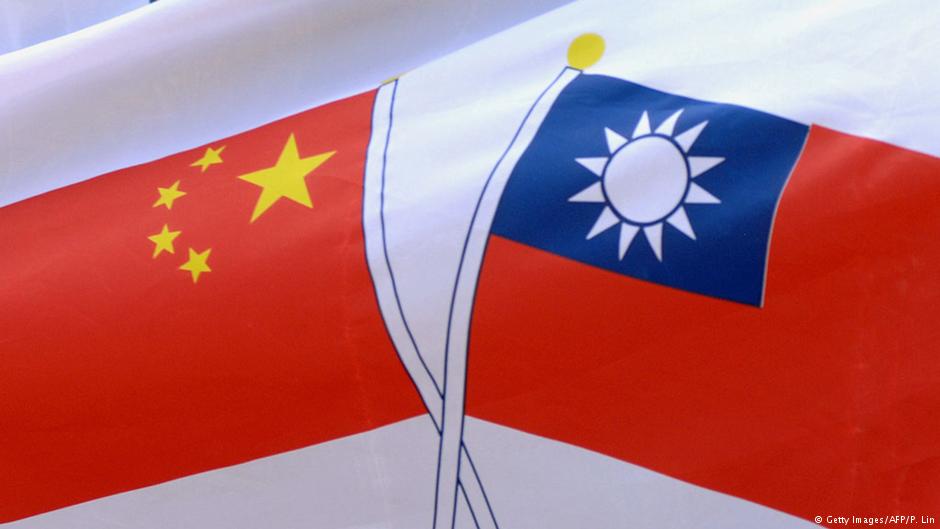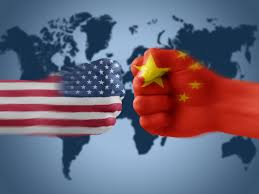 
 字體:小 中 大
字體:小 中 大 |
|
|
|
| 2016/12/18 00:13:51瀏覽438|回應3|推薦7 | |
|
40年來美國采《一中原則》:根據西方國際觀察家分析認為,這是美國總統歐巴瑪在任內最後一次的重要講話,因為狂人川普口不擇言,口口聲聲的,口出狂言的,大談不認識《一中原則》,搞亂起中國,美國,台灣的3角習題,尤其是接了台灣小英的賀電,就顯示出只有我川普,可以我行我素,為所欲為,這樣一來吃虧倒楣的就是台灣,果真不出所料,在川菜通電話的2週後,中國空軍兩度飛抵台灣四周,並接近台灣防空識別區,這顯示出中國以武力攻擊台灣的意圖提前,豪不諱言,中國當今的國防武力,有絕對的把握及優勢,在24小時內攻擊台灣省,並收復台灣省,完成統一大業.,美國總統歐巴瑪眼見事態嚴重,且有擴大績像,因為美國學界與智庫等專業人士,紛紛發表評論,導致兩極化的爭議不止,你們台灣的小英確幸災樂禍的無預警關閉,其TWITTER 及FB,而且刪除與川普的有關訊息,因為她業已受到無形與有形”壓力與恐嚇”,只好閃人且閉口.像是縮頭縮尾的無處躲藏,在台灣島內四處流串,拒絕媒體的追蹤採訪?
美國總統歐巴瑪企圖協助台灣,向中國表達40年來美國采《一中原則》無任何變化,也等同警告台灣當局的小英,切勿再製造中國,美國,台灣的無謂事端,同時也就是說提醒總統當選人川普,要小心謹慎的處理台灣議題,並不是出售更多的武器給予台灣,就可以解決台灣的議題,尤其甚者就是台獨的難題,必竟歐巴瑪可以說是美國有史以來與中國相處最容恰的時期,因為大國外交原本就是公平,互惠為原則,鬥而不破,且相互競爭,維護國家利益,這樣子甌巴碼表現可圈可點,有目共睹,相信歐巴碼在退休後撰寫其回憶錄時,會提起與中國國家主席習近平交鋒的重要事績,無論如何歐巴碼的臨別贈言,還是關心台灣的前途,親愛的台灣同胞們,你們的命運是掌握在自己的手裡,為什麼老是要外人政權,撐腰解危? 你們台灣人的民進黨,始終沒有顧及台灣老百姓的福祉,為了搞台獨,不惜以老百姓的身家性命,做賭注,這只是為了各人的政治利益毫無人性,這樣子的政黨與政權是短暫的猷如覃花一現因為”川菜通話”加速了中國以武力統一台灣的決心及毅力,以及以武力告訴全世界,收復台灣省是中國的家務事.
Trump’s Taiwan call: Tempest in a teapot? US president-elect Donald Trump spoke with Taiwan’s leader in what amounted to a congratulatory phone call from Taipei. The ten minute chat with President Tsai Ing-wen touched on what the Trump team called “the close economic, political and security ties between Taiwan and the US. ” Yet the perfunctory but polite discussion broke a Beijing taboo that senior American officials can’t speak with their Taiwan counterparts. Imagine for a moment a different scenario. When Barack Obama was president-elect, he regularly spoke of “reaching out” to entrenched adversaries and dictatorships as part of a new smart diplomacy which would challenge the status quo and offer the hand of friendship from the USA seeking new opportunities to solve age old and seemingly intractable problems. Obama’s moves were often praised as bold and innovative leadership in the face of a static status quo. But when the unpredictable Donald Trump “reached out” to the president of a democratic, albeit diplomatically isolated, Taiwan the mainstream media went into apoplectic overdrive.
Since Jimmy Carter opened de jure diplomatic relations with Beijing in 1979, no American president has officially spoken to Taiwan’s leaders. Donald Trump broke the logjam by speaking with Tsai Ing-wen, herself elected earlier in the year as the Republic of China’s first female president. The point is that Trump is President-elect and thus not making American policy. He is testing the waters but remains a private citizen. Moreover, does Beijing have the power to tell a sovereign American with whom to speak? Still the PRC’s “One China Policy” accepted by Washington presumably allows Americans very little policy flexibility. The New York Times warned on page one, “Trump disrupts China relations with Taiwan call, a Breach of Protocol.” Even the more sober Wall Street Journal argued, “Trump Taiwan call risks China ire.” But as the Taipei Times advised editorially, “Trump taking the call from Tsai not only helps put Taiwan back on the world map, but it sends a stern message to those nations who chose to kowtow to China’s bullying and let Beijing dictate what they can do.” News of president-elect Trump’s phone conversation with Taiwan President Tsai In-wen was treated by an incredulous media as a kind of diplomatic Tsunami triggered by the Donald to deliberately disrupt the fragile if static status quo between rival Chinese governments in Beijing and Taipei. It also tests the parameters of the rigid relationship between Beijing and Washington.
Whether one congratulatory phone call across the Pacific can disrupt the reasonably placid waters across the Taiwan Straits is disputable. At first Beijing was decidedly cautious in criticism; now there’s a crescendo of predictable and well rehearsed bluster about “reckless” moves towards what it considers a “renegade province.” Ironically there appeared to be more caustic critiques and political bromides from the American media than from Beijing who understands the deep reality of the wider USA/PRC relationship. Yet Taipei’s respected China Post warned editorially, “Catapulting Taiwan into the international limelight works in Tsai’s favor as an embattled president struggling to shore up domestic support, but the question is, at what cost?” Back in mid-December 1978, President Jimmy Carter did an end run around Congress and unexpectedly announced a switch of US diplomatic recognition to the People’s Republic of China effective 1 January 1979. Ronald Reagan, then a candidate for president the following year, regularly rebuked Carter’s move and spoke of his warm and positive feeling towards Taiwan, an island he had visited as California Governor and with whom he hinted of a renewed political relationship.
Though Reagan never switched diplomatic ties back to Taipei, in the subsequent years the de facto unofficial economic and political ties between Taiwan and the USA has grown dramatically. That’s unofficial with layers of nuance and obfuscation.
But in the Trump Template the People’s Republic of China represents one of his key campaign themes; the loss of American jobs and the unfair and growing trade deficits. In 2015 the US trade deficit with the PRC reached $367 billion. Even a decade ago, the PRC/USA deficit was already $202 billion. Two-way US/Taiwan trade last year reached $67 billion. Moreover China’s assertive geopolitical moves in the South China Sea are seen as a direct challenge to American interests.
The Obama Administration’s lauded but politically half-hearted Pacific Pivot has not significantly improved the US position. So it seems what the Donald may be doing as a brash businessman is offering a wink to the competition just to get the bigger deal back on track. Leverage is what Trump understands.
How this tactic will work with both Beijing and Taipei remains unpredictable. Obama explains the risk of Trump’s messing with China on Taiwan. If China hadn’t provided warning enough to Donald Trump by seizing an American vessel in the South China Sea and threatening sanctions on an unnamed US automaker, president Obama had clear advice at a press conference today: think things through before you mess with Taiwan. It’s not clear how much foreign policy issues have come up in Obama and Trump’s regular phone calls, but the president’s clearly spelled-out message seems to imply his successor is yet to fully grasp China’s vision of itself, or of the way negotiations play out with a global superpower. The quote is worth reading in full: “Understand that with China, the issue of Taiwan is as important as anything on their docket. The idea of ‘one China’ is at the heart of their conception as a nation. And so if you are going to upend this understanding, you have to have thought through what the consequences are, because the Chinese will not treat that the way they will treat some other issues. This goes to the core of how they see themselves, and their reaction on this issue could end up being very significant. That doesn’t mean you have to adhere to everything that’s been done in the past…it does mean that you have to think it through.” If you look at that in context with a statement from the same press conference, you can get an idea of how little Trump might have gamed out his tactics on China: “Since there’s only one president a time, my advice to him is that, before he starts having a lot of interaction with foreign governments, beyond the usual courtesy calls, he should have his full team in place,” Obama said. The overall message is: it’s your foreign policy but make damn sure you know what steps two, three, four and down to twenty are before going straight for the motherload from the word “go.” Because this isn’t Manhattan real estate, it’s an ancient country with a strong sense of identity and a lot of tools at its disposal, beginning with the kinds of cyber-attacks it’s been prying away with for years. Instead, the way Trump’s acted so far has been the real world equivalent of his reported advice to a US official in 1990 on how to strike a “great deal” with the Soviets on nuclear arms: “Trump told him to arrive late, stand over the Soviet negotiator, stick his finger in his chest, and say, ‘Fuck you!,'” the New Yorker‘s Evan Osnos reported earlier this year. Beyond angering China and unleashing potentially serious consequences for the US, Obama also subtly pointed out that using Taiwan as a negotiating chip could end up very badly for the island itself. The current uneasy balance of Taiwanese relative autonomy without self-determination, he argued, “has kept the peace and given the Taiwanese an economy of people who have some degree of self-determination.” His point? That the wrong moves could quickly see Taiwan’s peace and self-determination go the sad way of the heavily-oppressed Uighurs in China’s restive north-western region of Xinjiang. That’s not what anyone needs. Obama says China would not take change in U.S. policy on Taiwan Lightly. . WASHINGTON President Barack Obama said on Friday it was fine for President-elect Donald Trump to review Washington's "one-China" policy toward Taiwan, but he cautioned that a shift could lead to significant consequences in the U.S. relationship with Beijing. "For China, the issue of Taiwan is as important as anything on their docket," Obama told a news conference. "The idea of one China is at the heart of their conception as a nation and so if you are going to upend this understanding, you have to have thought through what ... the consequences are." China lodged a diplomatic protest earlier this month after Trump, a Republican, spoke by phone with President Tsai Ing-wen of Taiwan. The 10-minute telephone call was the first of its kind by a U.S. president-elect or president since President Jimmy Carter switched diplomatic recognition from Taiwan to China in 1979, acknowledging Taiwan as part of "one China".
Obama noted that, under the decades-old policy, China had recognized Taiwan was its own entity that did things its own way, while Taiwan had agreed that, with some autonomy, it would not declare independence.
"That status quo, although not completely satisfactory to any of the parties involved, has kept the peace and allowed the Taiwanese to be a pretty successful ... economy and a people who have a high degree of self-determination," Obama said.
The Democratic president said he had advised Trump that foreign policy had to be conducted in a systematic, deliberate, intentional way. "There's probably no bilateral relationship that carries more significance and ... where there's also the potential, if that relationship breaks down or goes into a full conflict mode, that everybody is worse off," he said of the U.S.-China ties.
He said Beijing would not treat a departure from U.S. policy toward Taiwan lightly. "The Chinese will not treat that the way they'll treat some other issues. They won't even treat it the way they treat issues around the South China Sea, where we've had a lot of tensions," he said. Taiwan reiterated it was committed to keeping the status quo in its relations with China and in promoting peace and stability, and thanked Washington for deepening U.S.-Taiwan relations. A statement from Taiwan's Presidential Office said Tsai's government looked forward to strengthening that relationship under Trump's administration. 美國總統奧巴馬周五提醒其繼任者特朗普,如果上任後,要謹防北京方面對一些非常有象徵性的可能強烈反應,如他最近讓大家以為他將終結對“一個中國”立場的承認。奧巴馬在一項白宮記者會時強調說:台灣屬於中國的一部分一直是中國的重心想法。 奧巴馬還向特朗普喊話說,“所以如果你想要終結這個想法,你應該想到接下來的後果,因為對於這個問題,中國不會像對待其他問題一樣地處理,這也就是關鍵的所在。中國看這問題的方式 以及對這個問題的反應將是非常強烈的。”四十年來,美國一直採取《一個中國的原則》;而與北京有外交關係的其他國家,就不能與台灣有外交關係。台灣人自求多福不要再度被美國人出賣賠了夫人又折兵得不償失.
|
|
| ( 時事評論|國防軍事 ) |













